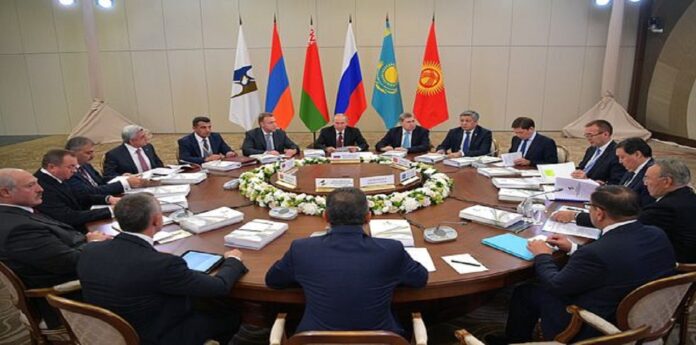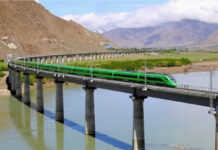Central Asia has recently been in the geopolitical spotlight with the Taliban’s takeover of Afghanistan and political upheaval in Kazakhstan. Russia’s special military actions in Ukraine have once again drawn attention to Central Asia for two reasons. Firstly, Russia is Central Asia’s closest confidant not just in terms of security cooperation but also in terms of economic partnership. Secondly, Russian advances in Ukraine have given rise to certain geopolitical concerns among post-Soviet nations.
By Dr Pravesh Kumar Gupta
Russia maintains its position as a security guarantor in Central Asia through the Collective Security Treaty Organization (CSTO), whose members include Belarus, Armenia, Kazakhstan, Kyrgyzstan, and Tajikistan. This security mechanism had a low profile until the Taliban took power in Kabul, and there were concerns about security risks emanating from the nation. In January 2022, the CSTO was also instrumental in quelling large protests in Kazakhstan. However, Kazakhstan’s decision to request the CSTO to control the protesters has been widely criticised. Nonetheless, Russia’s position has become strengthened.
The ongoing conflict between Ukraine and Russia will directly affect Central Asian countries. Although the Central Asian countries have taken a neutral stance on the conflict, leaders of Uzbekistan, Kazakhstan, and Kyrgyzstan had a telephonic conversation with Putin following the special military operation in Ukraine launched by Moscow on February 24, 2022. Consequently, the US and western countries have taken strong measures to limit Moscow’s economic capabilities by putting strict economic sanctions. It will have a huge impact on Central Asian economies. Remittances from migrant workers in Russia provide a large portion of the GDP of Kyrgyzstan, Tajikistan, and Uzbekistan. In 2014, after Russia annexed Crimea, economic sanctions were followed, impacting Central Asia as well. This time, it is more critical as the Central Asian economies are already facing troubles due to unprecedented challenges thrown up by the COVID-19 pandemic.
How Russia-Ukraine Crisis will impact Central Asia
The Russia-Ukraine conflict will have economic and geopolitical repercussions for the Central Asian region.
Economic Impact
Russia is one of the largest trading partners of Central Asian countries. Kazakhstan and Kyrgyzstan are members of the Russia-led Eurasian Economic Union (EAEU), while Uzbekistan holds observer status. By the end of 2021, the external trade of EAEU had increased by more than 34%, while internal trade had increased by 67%. This is a good sign of the Eurasian Union’s developing trade and economic relations. The total GDP growth rate was 4.4 percent, substantially greater than anticipated. The economic sanction on Russia would negatively impact the Eurasian Economic Union’s external and internal trade.
Furthermore, Central Asian labour migrants in Russia contribute significantly to their respective national economies. According to the Russian Ministry of Internal Affairs, more than 3 million migrant labourers from Uzbekistan, over 1.6 million from Tajikistan, and 620,000 from the Kyrgyz Republic entered Russia between January and September 2021. Furthermore, primarily from Russia, the remittances account for 30% of Tajikistan’s GDP, 28% of Kyrgyzstan’s GDP, and about 12% of Uzbekistan’s GDP. With the announcement of sanctions from America, the UK, and other European countries, the rouble has begun plunging, reducing the value of migrant workers’ incomes and savings. Similar depreciation in the national currencies of Kazakhstan, Kyrgyzstan, and Uzbekistan was also recorded.
Geopolitical Concerns
Russia’s involvement in the January 2022 protests in Kazakhstan is frequently viewed through the lens of an expanded and dominant Russian presence in the region. As a result, geopolitical concerns about Russia’s interventionist policies in the backdrop of the Ukraine crisis have also resonated across Central Asia. As a result, there have been no reactions from Central Asian countries supporting Russia’s actions in Ukraine. Neither has there been any condemnation of Russia’s military acts in Ukraine by the Central Asian leaders. It may be noted that Russia will not occupy Kazakhstan, nor will it conquer Bishkek or Tashkent. However, Moscow maintains military bases in Central Asia and constantly seeks opportunities to use crises and societal schisms for geopolitical benefit. Following a successful excursion into Kazakhstan, Russia’s military participation in Central Asia is more likely.
Responses from Central Asia
Russia’s efforts to secure the support of its Central Asian allies in response to military advances in Ukraine have garnered meagre results. On February 26, the Kremlin press office reported on a phone discussion between President Vladimir Putin and Kyrgyzstan’s president, Sadyr Japarov. The official statement reads, “Sadyr Zhaparov, noting Kyiv’s responsibility for the failure of the Minsk agreements, expressed support for the decisive action Russian side to protect the civilian population of Donbas. Vladimir Putin thanked the President of Kyrgyzstan for his principled stand of solidarity.”[3] This looked to be its lone victory as yet on this front. However, the statement posted on the Kyrgyz President’s official website had no mention of Kyrgyz solidarity with Russian military actions in Ukraine.[4]
Uzbek President Shawkat Mirziyoyev also held a telephonic discussion with Putin on February 25, 2022. The official statement from the Uzbek side stated that “an exchange of views also took place on the international and regional agenda, including the current situation around Ukraine.”[5] On the contrary, the Russian official statement mentioned that “Shavkat Mirziyoyev expressed understanding of the actions taken by the Russian side.”[6] The ambiguity caused by these conflicting statements forced President Mirziyoyev’s Press Secretary Sherzod Asadov to release a clarifying mentioning that, “Uzbekistan maintains a balanced, neutral stance on this issue, and released a statement clarifying that conflicts and disagreements must be resolved only based on international law norms.”[7] Like Kyrgyzstan and Uzbekistan, Kazakhstan also abstained from making any statement against or supporting Russian military activities in Ukraine. However, Kazakhstan’s closed economic and security relations with Moscow will undergo a test post renewed western sanctions against Russia.
Meeting of the Heads of the Governments of the Members of EAEU
President Kassym-Jomart Tokayev hosted a meeting with the heads of government of the member states of the Eurasian Economic Union on February 25, 2022. Prime Minister of Belarus Roman Golovchenko, Prime Minister of Armenia Nikol Pashinyan, Prime Minister of Kazakhstan Alikhan Smailov, Prime Minister of Russia Mikhail Mishustin, Chairman of the Cabinet of Ministers of the Kyrgyz Republic Akylbek Japarov, Prime Minister of Uzbekistan Abdulla Aripov as an observer state and Chairman of the Eurasian Economic Commission attended this meeting.[8]
This meeting was called immediately to address Western sanctions’ repercussions against Russia and propose some solutions. Because there is already a significant interconnectedness of economic, financial, and industrial systems, the Eurasian Union decided to set up a working group. This working group will assess risks and develop economic solutions to mitigate the negative effects of the sanctions placed on Russia impacting the Eurasian economy.[9]
Conclusion
The Russia-Ukraine conflict has put Central Asian nations in a tough situation once again. They have avoided making any pronouncements for the time being, but the ramifications from this conflict will have a long-term influence on the region. The fear generated by this crisis may make Central Asian leadership cautious of Moscow’s efforts. As a result, it will become important for Russia to secure the economic well-being and security of its Central Asian neighbours. The role of the CSTO and the EAEU will be held in higher regard than ever before. Furthermore, the regional cooperation that has taken a positive turn lately will be strengthened following this situation.
This article first appeared in www.vifindia.org and it belongs to them.








